In Arizona, a number of hospital systems have instituted policies requiring their employees to be vaccinated by November 1. While there have been no known legal challenges to these policies, courts in other states have addressed the issue.

Over the past couple of months, courts have upheld vaccine mandates. In the Texas case, 117 employees of a hospital challenged the hospital’s policy requiring employees to receive a COVID-19 vaccine as a condition of ongoing employment. The plaintiffs had alleged that employees who were terminated were wrongfully terminated. The district court cited the EEOC guidance confirming that employers may utilize vaccine mandates without violating the EEO laws. In a strong statement endorsing mandatory vaccine policies, the court held the employees “can freely choose to accept or refuse a COVID-19 vaccine; however, if [they] refuse, [they] will simply need to work somewhere else.” The plaintiffs subsequently appealed the decision to the Court of Appeals for the Fifth Circuit.
In an Indiana case, eight students challenged Indiana University’s policy requiring all students, staff, and faculty to receive the COVID-19 vaccine before starting classes in August unless they qualified for a religious or medical exemption. If a student qualified for an exemption, the student would have to wear a mask at all times and also be subject to regular testing. The eight student plaintiffs challenged the policy by claiming that it violated the due process clause of the Fourteenth Amendment of the constitution. The court rejected the claim and held that Indiana University had a legitimate interest of public health for its students, faculty, and staff. On August 2, 2021, the Seventh Circuit affirmed the district court’s decision.

Arizona private employers, in healthcare or otherwise, considering a vaccine mandate for their company, should keep the following considerations in mind:
– There needs to be a medical exemption in the policy. Under the Americans with Disabilities Act (“ADA”) employers must provide reasonable accommodations for those employees who cannot comply with the vaccine mandate because of a medical condition.
– There must be an exemption for an individual whose sincerely held religious beliefs prevents him/her from getting a vaccine. Under Title VII, employers must provide a reasonable accommodation unless doing so poses an undue hardship.
– Employers should give employees advance notice of the date by which the employee needs to be fully vaccinated. This allows the employee to schedule a vaccination, apply for an exemption, or look for another job.
– Employers can require employees to show proof of a COVID-19 vaccination. The EEOC guidance permits employer-inquiries to an employee regarding receipt of a vaccine from a third party, stating the inquiry is not disability-related. Employers are cautioned, however, not to make additional inquiries past the employee’s vaccination status, as further questions could reveal disability-related information.
– Employers must ensure the confidentiality of vaccine-related information. Under the ADA, the EEOC guidance requires employers to maintain COVID-19 related information separately from the employee’s personnel file and to keep the information private and confidential.
Employers need to stay up-to-date on state laws in this area. For example, in Arizona, legislation was proposed that would prohibit employers from being able to require an individual to be vaccinated as a condition of employment. The bill did not progress. Meanwhile, in Colorado, HB 1191 would have prohibited an employer from taking adverse action against an employee or an applicant for employment based on their COVID-19 immunization status, but that bill was postponed by the House Committee on Health and Insurance. In Montana, however, on May 7, 2021, Governor Greg Gianforte signed House Bill 702 into law, prohibiting employers from requiring employees to disclose their immunization status and barring employers from requiring employees to receive certain types of vaccines or to possess an immunity passport.
Jessica Post is the Employment and Labor Practice Group Director at Fennemore. She assists companies in employment discrimination, wage and hour, restrictive covenant and trade theft. She also works closely with human resources professionals to ensure clients comply with applicable state and federal labor laws. Reach her at [email protected].
Jason Nutzman is an attorney with Fennemore. Among his practice areas, he works with human resource managers and in-house counsel providing employment advice and litigation support. Reach him at [email protected].
















Add comment